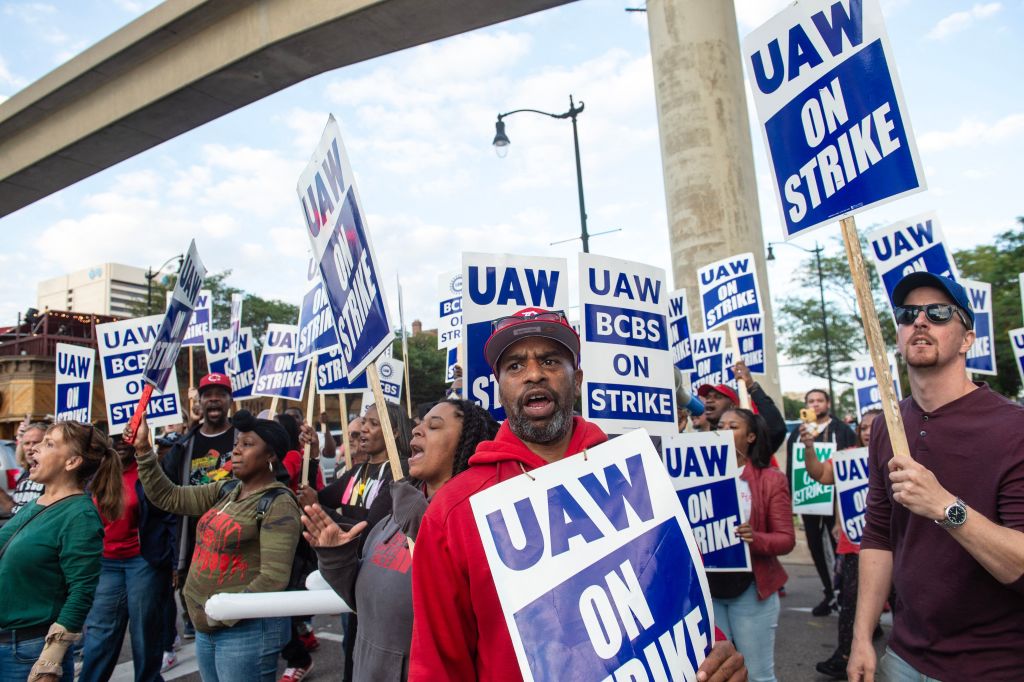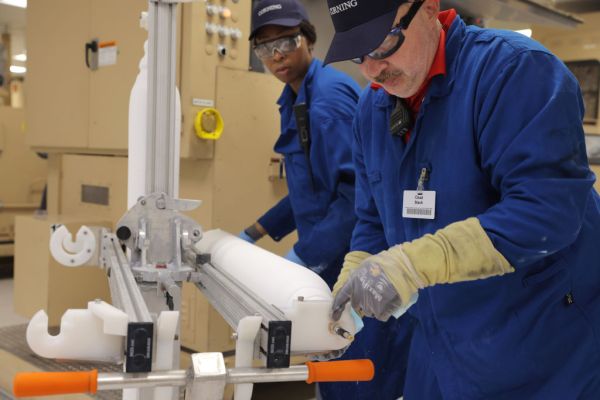Happy Tuesday! Investors in lab-grown meat companies are probably breathing a big sigh of relief after a trio of Islamic scholars and a Jewish kosher certification authority cleared cultivated meats as Halal and Kosher, respectively. Not everyday you can add about 2 billion people to your potential customer base essentially overnight.
Quick Hits: Today’s Top Stories
- Five American citizens held prisoner in Iran—several of whom were behind bars for more than five years—were freed yesterday and, as of last night, making their way back to the United States by way of Qatar. The prisoner release was part of a deal Iran brokered with the Biden administration in exchange for the release of five Iranians detained for sanctions violations and the unfreezing of $6 billion in Iranian oil money.
- The wreckage of an F-35 jet lost on Sunday evening after the pilot flying the aircraft made an emergency bailout was located last night in Williamsburg County, 100 miles north of Charleston, South Carolina, according to military officials. It’s unclear what led to the incident, but the Marine Corps is suspending all aviation unit flights for two days— to “discuss aviation safety matters and best practices”—in response to the crash and other mishaps in recent weeks.
- Former President Donald Trump will reportedly skip next Wednesday’s Republican primary debate at the Ronald Reagan Presidential Library in California, opting instead to give a primetime speech to a group of blue-collar, union workers in Detroit.
- Rep. Jennifer Wexton—a Democrat from Virginia—announced yesterday that she will not seek reelection for a fourth term after receiving a diagnosis of a rare neurological disorder called progressive supranuclear palsy. Wexton revealed in April that she had Parkinson’s disease but intended to serve “for many years to come.” In intervening months, the 55-year-old didn’t respond well to treatment, leading to the updated diagnosis. Wexton’s seat is in a competitive district that prior to her first election in 2018 was in Republican hands for 40 years.*
- Gil Cisneros—a former one-term Democratic congressman from California—said yesterday he is running in California’s 31st Congressional District to replace Democratic Rep. Grace Napolitano, who is retiring at the end of her current term. Cisneros was first elected in 2018, but lost his reelection fight in 2020 to a Republican challenger and later became a Biden administration Defense Department appointee charged with implementing the Pentagon’s diversity, equity, and inclusion efforts.
Biden’s Coalition Under Pressure

As the clock struck midnight last Thursday night, United Auto Workers (UAW) began their targeted “stand up” strikes against the “Big Three” American automobile manufacturers—Stellantis (formerly Chrysler), Ford, and General Motors—marking the first time the union has gone on strike at all three companies at once.
Over the weekend, a number of Democratic elected officials—mostly from the Midwest and U.S. manufacturing strongholds—made pilgrimages to picket lines to prove their labor bona fides. Sens. Gary Peters of Michigan, John Fetterman of Pennsylvania, and Sherrod Brown of Ohio—among plenty of other pols—gripped and grinned in front of the UAW locals and striking plants, posing in union-made cars and shouting, “No justice, no Jeeps!” along with union members. “In the opening hours of the #StandUpStrike, @SenSherrodBrown stands with @UAW in Toledo,” the Ohio branch of the AFL-CIO, the largest federation of unions in the country, posted on X on Saturday, along with a picture of Brown surrounded by picketers. “Because of course he does.”
That certainty from the AFL-CIO—and the mobilization by Democratic politicians—belies a much more complicated picture of a serious strike that is testing the strength of President Joe Biden’s coalition. At the heart of the negotiations with the automakers are UAW’s concerns about the future of auto manufacturing as car companies face pressure from the Biden administration to transition to electric vehicles (EVs), which labor activists fear may come at the cost of union jobs. Though the strikes may result in a slower rollout of EVs—or in EVs and batteries being produced in non-union factories in right-to-work states—environmental organizations who have criticized Biden for not being aggressive enough in combating climate change are nonetheless expressing solidarity with the strikers.
As we reported last week, the UAW strikes are the latest in a series of high-profile labor disputes this year. Last month alone, U.S. work stoppages resulted in a combined 4.1 million missed days of work—the highest such figure in more than two decades. This particular walkout is unique, though. “They’re bargaining with all three [companies] at the same time, and they’re using a rolling strike,” Kate Bronfenbrenner, director of labor education research at Cornell University’s School of Industrial and Labor Relations, tells TMD. This strategy makes it “much harder for management to plan ahead and get prepared, because they don’t know where the union’s going to strike next.” About 13,000 workers—of the nearly 150,000 UAW members employed by the Big Three—are currently on strike.
This aggressive approach is matched by a hefty set of demands: The UAW wants, among other things, a 40 percent pay increase over the course of its next four-year contract, a 32-hour week with overtime pay for any additional hours worked, an end to a tiered wage system that results in entry-level workers earning less per hour than others for the same work, and the return of expanded pension benefits they gave up during previous negotiations. The Big Three—who have reportedly countered with pay raises of around 20 percent—say meeting the UAW’s demands would make them less competitive against foreign manufacturers with lower labor costs like Toyota or Honda, while Shawn Fain, UAW’s president, has argued C-suite greed is keeping workers on “poverty wages.”
In a speech at the White House on the first full day of the strike, Biden—who often refers to himself as the most pro-union president in history—seemed to side with the UAW, calling on the companies to share the wealth. “Workers deserve a fair share of the benefits they help create for an enterprise,” he said. “Record corporate profits—which they have—should be shared by record contracts for the UAW.”
Biden glancingly acknowledged the transition to EVs that his administration is encouraging, saying it should be “fair and a win-win” for labor and management. The administration wants two-thirds of all new passenger cars to be all-electric by 2032, a stance officials are pushing with Environmental Protection Agency rulemaking and billions in consumer tax incentives and subsidies.
But the UAW isn’t necessarily thrilled about this green transition, despite the group’s traditional alignment with Democrats. Car manufacturers are redirecting billions of dollars toward research and development in an effort to make electric cars a viable option for consumers—money that assembly line workers won’t see. Plus, EVs are less labor-intensive to produce and require fewer workers. As manufacturers ramp up electric car production, the union fears they might close gas car factories, eliminating jobs that may not be replaced by positions on manufacturing floors devoted to electric cars.
EV battery production is also moving ever southward, into what’s becoming known as the “battery belt.” Many of these states—like Georgia, Tennessee, and South Carolina—have “right-to-work” laws, meaning membership of a union cannot be a condition of employment. “The strike is reinforcing the message that auto makers should build their EVs as far away from the UAW’s reach as possible, whether in right-to-work U.S. states or Mexico,” the Wall Street Journal’s editorial board wrote Friday.
Although more than 98 percent of the UAW’s political donations have gone to Democrats during essentially every election cycle since 1990, the union—whose reputation is still recovering from a corruption probe that has led to the conviction of more than a dozen top union officials—is withholding its endorsement of Biden’s 2024 campaign in an effort to maintain leverage over the administration. “The federal government is pouring billions into the electric vehicle transition, with no strings attached and no commitment to workers,” Fain said in a memo to members this spring. “The EV transition is at serious risk of becoming a race to the bottom. We want to see national leadership have our back on this before we make any commitments.” He reiterated that point on Face the Nation this weekend: “Our endorsements are going to be earned.” (The AFL-CIO endorsed Biden in June, as did more than a dozen other unions.)
In recent TV appearances, Fain has sent mixed messages about what exactly Biden would have to do to earn that endorsement. “We expect action, not words,” Fain said Sunday. But before long, he was also essentially telling the administration—which had planned to dispatch Acting Labor Secretary Julie Su and top economic advisor Gene Sperling to Michigan to help the parties come to an agreement—not to “inject themselves” into the negotiation. Fain doubled down on his preference during a Monday episode of MSNBC’s Morning Joe, saying the administration was “not at all” key to brokering an agreement.
The UAW does have allies—and in some unlikely places, considering the union’s brake-pumping on the transition to EVs. More than 100 labor, racial justice, and environmental groups signed an open letter to the Big Three in support of the strike.
Environmental groups—which often snipe at Biden for pursuing what they consider his half-measures on climate change—may be willing to accept a delay in their own goals in the name of solidarity. Only one EV-producing plant has been affected so far, but production may yet be slowed as the strike grinds on.“There is no reason why the transition from outdated fossil fuel cars to electric vehicles can’t be a win for workers, the climate, the auto industry, and consumers,” Ben Jealous, the executive director of the environmentalist Sierra Club, tells TMD. “First and foremost, that means ensuring that the electric vehicle transition includes good union contracts for workers—offering the same pay, benefits, and safety standards—not a race to the bottom that further exploits workers. We all have the right to make a living on a living planet.”
Republicans are trying to take advantage of the cleavage within the Democratic coalition, but the effort from organized labor’s longtime foes is unlikely to yield results. Former President Donald Trump will attempt to regain ground in Michigan—a state he won in 2016 (with particular help from union households) but lost to Biden in 2020—with a speech to union members in Detroit on September 27. The event will serve as counterprogramming to the second GOP debate, which he’s skipping.
Republicans may be hoping to tie any discontent to Biden as the strikes begin to impact the wider economy. The Big Three have begun to lay off workers at plants using parts produced by the shuttered ones, including in Detroit, where Ford fired 600 non-striking workers. Depending on the length of the stoppage, consumers may eventually see domestic car prices go up. While one particularly dire estimate based on a full strike of all three plants for 10 full days has economic losses hitting $5 billion, the more limited rolling strike might reduce or slow the effects on the rest of the economy. “This green agenda that is using taxpayer dollars to drive our automotive economy into electric vehicles is understandably causing great anxiety among UAW members,” former Vice President Mike Pence said Sunday, adding the union is “rightly pushing back” on Biden’s policies.
The strike, now entering its fifth day, shows few signs of drawing to a close, with negotiations continuing to stall out on Monday. Late in the day, Fain announced another stoppage deadline, threatening to add to the number of workers on strike if “Ford, General Motors or Stellantis have not made substantial progress toward a fair agreement” by Friday, September 22, at noon.
Worth Your Time
- Are expiration dates on food more trouble than they’re worth? “Food experts broadly agree that the expiration dates on every box of crackers, can of beans and bag of apples waste money, squander perfectly good food, needlessly clog landfills, spew methane and contribute to climate change,” Josh Zumbrun writes for the Wall Street Journal. “Although we call them expiration dates, most don’t actually claim anything is expiring or unsafe. Instead, the labels say ‘fresh until,’ ‘display until,’ ‘best when used by,’ ‘better if used by,’ ‘sell by,’ ‘best by,’ ‘enjoy by,’ ‘best before’ or—perhaps worst—provide a date with no explanation at all. The dates originated as a coded system for manufacturers to communicate to retailers when to rotate stock. Consumers clamored for information on the freshness of food, and in the 1970s and 1980s consumer-facing dates became widespread, though never standardized. Food manufacturers have tried, largely in vain, to explain that these are mostly general indicators of when food is at its peak quality. Most foods, properly stored, remain edible and safe long after their peak.”
Presented Without Comment
ABC News: Trump Wrote To-Do Lists for Assistant on White House Documents Marked Classified
Also Presented Without Comment
Washington Examiner: [GOP Sen.] Susan Collins Jokes She Will ‘Wear a Bikini’ in Response to Senate Dress Code Change
Toeing the Company Line
- Reminder! Midwestern readers can join Steve, Declan, Andrew, and fellow members of The Dispatch community at Twisted Vine Brewery in Des Moines, Iowa, for an informal meet and greet this Thursday at 6 p.m. CT. For more information about the event, click here.
- In the newsletters: Kevin makes the case (🔒) against Josh Hawley’s plan to save low-wage jobs from AI, the Dispatch Politics crew outlines Biden’s 2024 messaging strategy, and Nick argues (🔒) the pro-life movement is reaping the consequences of a Faustian bargain with Trump.
- On the podcasts: Drucker sits down with GOP Sen. Tom Cotton to discuss Ukraine aid and American foreign policy on The Dispatch Podcast, while the other two Davids explore a slew of Second Amendment cases on the latest Advisory Opinions.
- On the site today: Drucker reports on Gov. Glenn Youngkin’s push to elect Virginia Republicans this November, Charlotte unpacks the view of Israel’s judicial reforms from Tel Aviv, and Chris argues that we pay too much attention to presidential primary polling.
Let Us Know
What do you think of the demands made by the UAW on behalf of its workers? Reasonable? Excessive? And what would you do with eight extra hours if you could work a 32-hour work week?
Correction, September 19, 2023: This newsletter originally misidentified Rep. Wexton’s initial diagnosis.









Please note that we at The Dispatch hold ourselves, our work, and our commenters to a higher standard than other places on the internet. We welcome comments that foster genuine debate or discussion—including comments critical of us or our work—but responses that include ad hominem attacks on fellow Dispatch members or are intended to stoke fear and anger may be moderated.
You are currently using a limited time guest pass and do not have access to commenting. Consider subscribing to join the conversation.
With your membership, you only have the ability to comment on The Morning Dispatch articles. Consider upgrading to join the conversation everywhere.